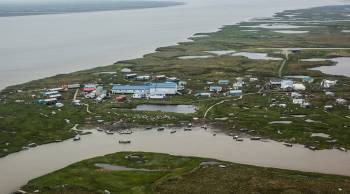
In Barbuda, locals ask: Do the costs of luxury developments outweigh the benefits?
In Barbuda, locals ask: Do the costs of luxury developments outweigh the benefits?

This story was produced by our colleagues at the BBC.
From a beautiful, pink sandy beach in the Caribbean, environmentalist John Mussington points to private resorts at either end of Barbuda’s southern coast. It’s known as the Barbuda Ocean Club, and they’re building hundreds of multimillion-dollar residences and a golf course.
“Luxury properties are built, golf courses are going to be built,” he said. “Sale of these luxury properties and [putting] them behind fence for persons living a private lifestyle will mean large areas of resources we depend on for livelihoods will no longer be available to us.”
Mussington is worried about the environmental impact, as the larger of the two resorts is within an area declared by the intergovernmental Ramsar Convention as a wetland of international significance.
The developments are sparking divides on the island: Some see the new resorts as threats to the local culture and ways of life, while others see them bringing much needed jobs to the region.
The developers leading the project, the American firms PLH Barbuda Limited and the Discovery Land Company, declined our request for an interview. But in a statement, they said that the project was approved in a transparent and inclusive process, that they’re doing a lot of environmental work — including restoring wetlands — and that they’ve created hundreds of jobs for Barbudans.
Mussington, however, has taken the government to court over another aspect of the project: the construction of an airport in the middle of the island, which he says is in an environmentally sensitive area.
“No proper environmental impact assessment was done. When an impact assessment turned up, the review by the Department of Environment said it was totally inadequate,” he said.
The case has been heard at the Privy Council in London, Antigua and Barbuda’s highest court. If Mussington wins, he’ll have the right that’s been denied to him to challenge the project and call for a judicial review, where a judge would look at the lawfulness of the process. But others — like local businesswoman Kelcina George, who runs Barbuda cottages — see the high-end resorts as good for the island’s economy.
“They’ve hired a lot of Barbudans, all the young people — everyone went to work there,” she said. “And from what I gather, they’re pretty happy with the money.”
Tourism is hugely important to Antigua and Barbuda — it accounts for 60% of GDP — but it took major hits following Hurricane Irma in 2017 and during the COVID-19 pandemic. That said, jobs are the priority, says the Antigua-based government.
“Well, I think it’s a vision of the government to bring Barbuda to a level where it has full employment,” said Charles Fernandez, the tourism and investment minister. “Barbuda — when it’s fully operational — is going to generate a tremendous amount in taxes.”
Barbuda is not alone. Around the world, there are similar battles taking place, as small paradise communities in beautiful locations attempt to balance economic need against protecting their own cultures and environments.
There’s a lot happening in the world. Through it all, Marketplace is here for you.
You rely on Marketplace to break down the world’s events and tell you how it affects you in a fact-based, approachable way. We rely on your financial support to keep making that possible.
Your donation today powers the independent journalism that you rely on. For just $5/month, you can help sustain Marketplace so we can keep reporting on the things that matter to you.

















